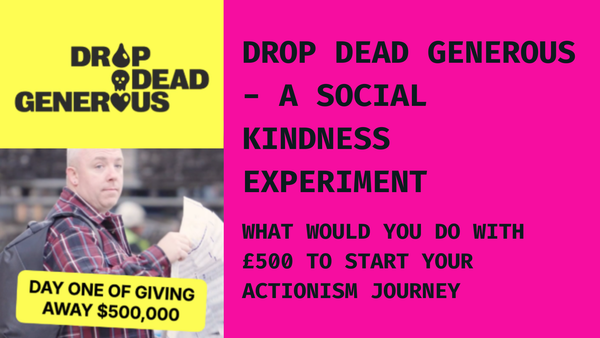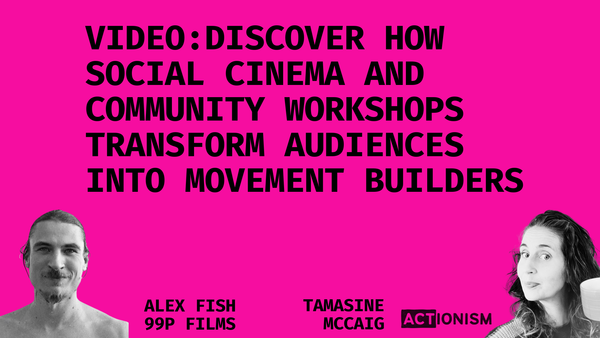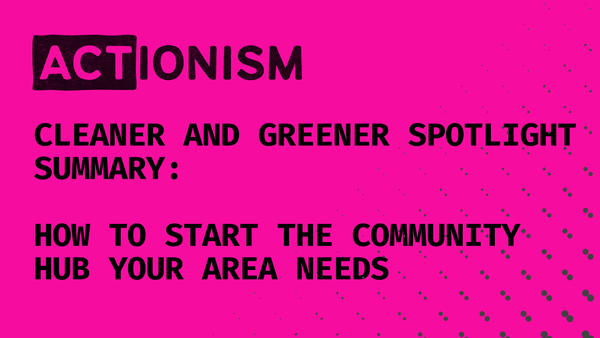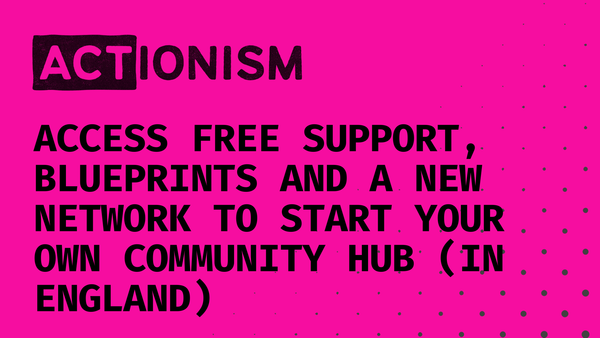How your small actions can transform your community
Every significant change starts with someone taking a single action. Not a perfectly formed plan. Just one person deciding to do something different. This is ACTionism

You've probably felt it before - that nagging sense that something in your neighbourhood isn't right. A pothole that never gets fixed. A neglected green space. Young people with nowhere safe to gather. Elderly residents feeling isolated. These frustrations can feel overwhelming because they seem too big for one person to tackle.
But here's what most people don't realise: every significant change starts with someone taking a single action. Not a grand gesture. Not a perfectly formed plan. Just one person deciding to do something different.
This is ACTionism - the philosophy that simple, cascading actions create systemic change - when we find the others and start! And you can start today, right where you live.
The Cascade: From Frustration to Change
Think of it like dropping a stone into a river. One ripple isn't much, but it spreads outward, touching everything around it.
Let me walk you through how this actually works in practice.
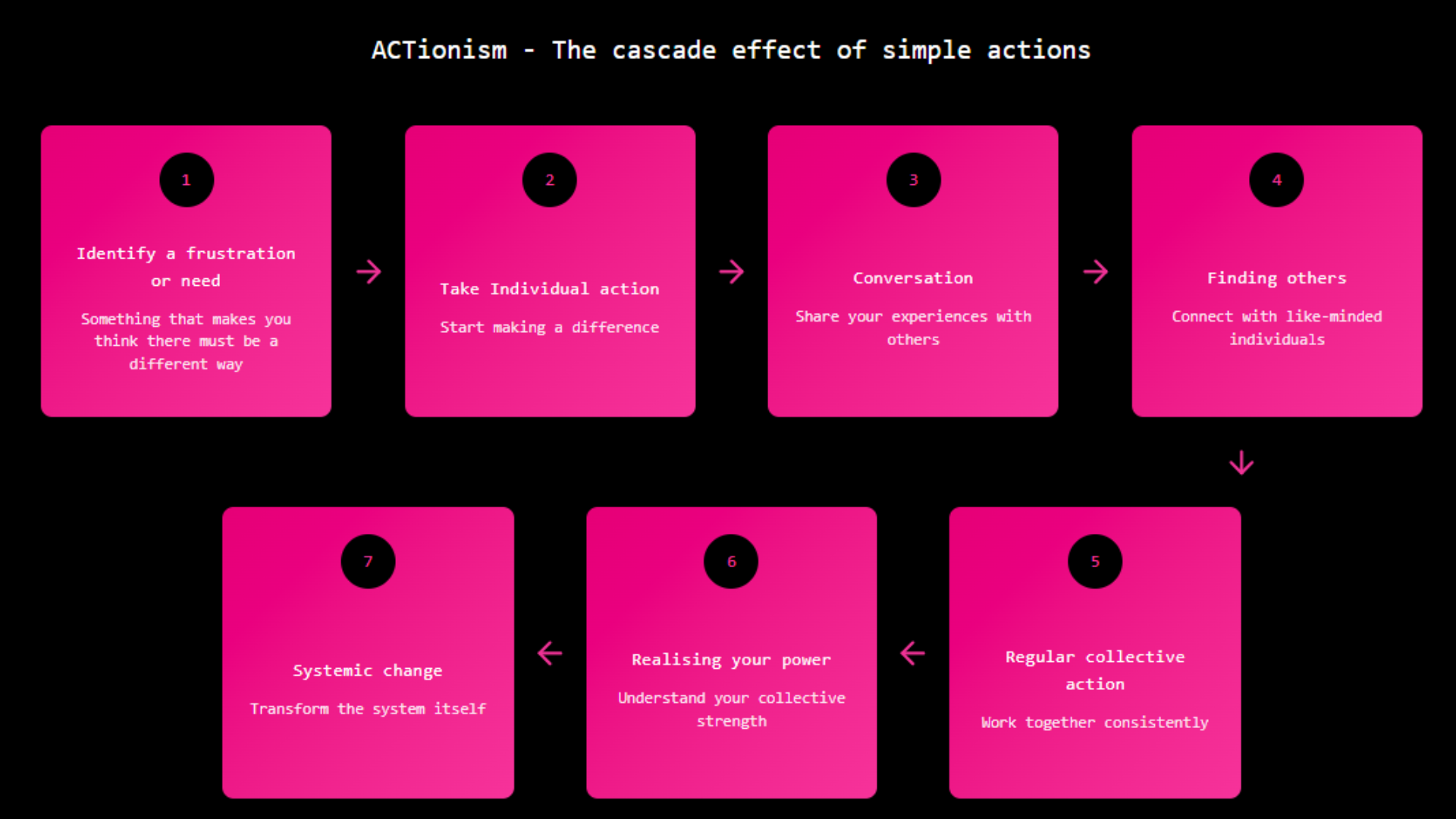
Stage 1: Identify Your Frustration or Need
Start here. What's something in your community that makes you think, "There must be a better way"?
Specific prompts to get you thinking:
- Is there a public space that's being underused or poorly maintained?
- Do you know someone (or a group of people) who are being overlooked?
- Is there a service or resource your neighbourhood desperately needs?
- Have you noticed something that affects children, elderly residents, or vulnerable people?
- What conversation do you keep having with friends or neighbours about what's "wrong" locally?
Don't overthink this. Your frustration is valid. It's the fuel that drives action.
Action: Write down one thing that bothers you. Just one. Keep it specific to your actual neighbourhood.
Stage 2: Take Individual Action
This is where most people get stuck. They think action requires a committee, a budget, or permission from someone in authority. It doesn't.
Individual action means starting small and visible. You're not solving the entire problem—you're making the first move.
Specific prompts for your first action:
- Can you spend two hours this week addressing this issue yourself?
- Who could you email, call, or visit to ask about this?
- Is there a small, visible change you could make that shows others you're serious?
- What information do you need to gather before taking the next step?
- Can you document what you find (photos, videos, testimonies) to show the scale of the problem?
Examples: Cleaning up a neglected community garden. Documenting potholes with photos and location data. Visiting a local councillor. Starting a simple survey asking neighbours what they'd like to change. Organising a small meeting in your living room.
Action: Commit to one specific action this week. Make it something you can actually do.
Stage 3: Have Conversations
Your action will attract attention. Some people will be curious. Some might want to help. This is where conversations begin.
Conversations are where movements are born. You're no longer acting alone—you're sharing your experience and inviting others into the picture.
Specific prompts for starting conversations:
- Who else has mentioned this problem to you?
- Which neighbours or friends might care about this issue?
- What local groups (schools, churches, community centres, sports clubs) have a stake in this?
- How can you tell your story in a way that helps others understand why you care?
- What would make someone you know want to join you?
Action: Talk to at least three people about what you're trying to address. Listen to their thoughts. You might discover you're not alone.
Stage 4: Find Others
This is the exciting bit. You'll discover that other people share your frustration. They've been waiting for someone to start. Now they can join you.
Finding others transforms you from a lone voice into a movement.
Specific prompts for building a group:
- Is there a local Facebook group or WhatsApp chat where you could mention what you're doing?
- Are there existing community organisations you could approach?
- Could you invite people to a simple gathering (coffee, a walk, a park meeting)?
- What would make it easy for someone interested to actually show up and help?
- How can you make participation feel achievable for busy people?
Action: Host or invite people to one gathering. Keep it simple. Tea and a quick chat count.
Stage 5: Regular Collective Action
Now you have a group. The real work begins. This is where consistent, sustained effort creates lasting change.
Collective action doesn't mean everyone has to do everything. It means showing up regularly, sharing the load, and staying committed.
Specific prompts for keeping momentum:
- How often will you meet or coordinate? (Weekly? Fortnightly? Monthly?)
- What specific tasks need doing, and who's willing to do them?
- How will you celebrate small wins to keep morale high?
- What's your system for communicating between meetings?
- How will you welcome new people who want to join?
Action: Schedule your next group meeting or coordination session. Make it a regular thing.
Stage 6: Realise Your Power
As you work together over weeks and months, something shifts. You'll start to see results. A neglected space transforms. A local issue gets media attention. A councillor finally takes action. Your voices are being heard.
This is when you truly understand your collective strength. You're not just complaining anymore—you're creating change.
Action: Take a moment to recognise what you've achieved together. Document it. Share it.
Stage 7: Systemic Change
The final stage is when your action influences broader systems. A successful community campaign becomes a model. Local policies change. Other neighbourhoods copy what you've done. The system itself starts to shift.
This might take months or years. But it starts with that first frustration you had.
Your First Step This Week
You don't need to understand the entire cascade right now. You just need to start at Stage 1.
Here's what to do:
- Spend 15 minutes identifying one frustration or need in your community. Be specific. Be local.
- Write it down. One sentence.
- Identify one small action you could take this week to address it or understand it better. Something achievable.
- Do it.
That's it. You've begun.
You've started a cascade. You won't see all seven stages happen overnight. But every significant change in every community started exactly like this - with one person frustrated enough to act, brave enough to try something different.
What's your frustration?
What issue in your community makes you think there must be a better way? Share it in the comments below. You might inspire someone else to act—or find an ally who's been thinking the same thing.

